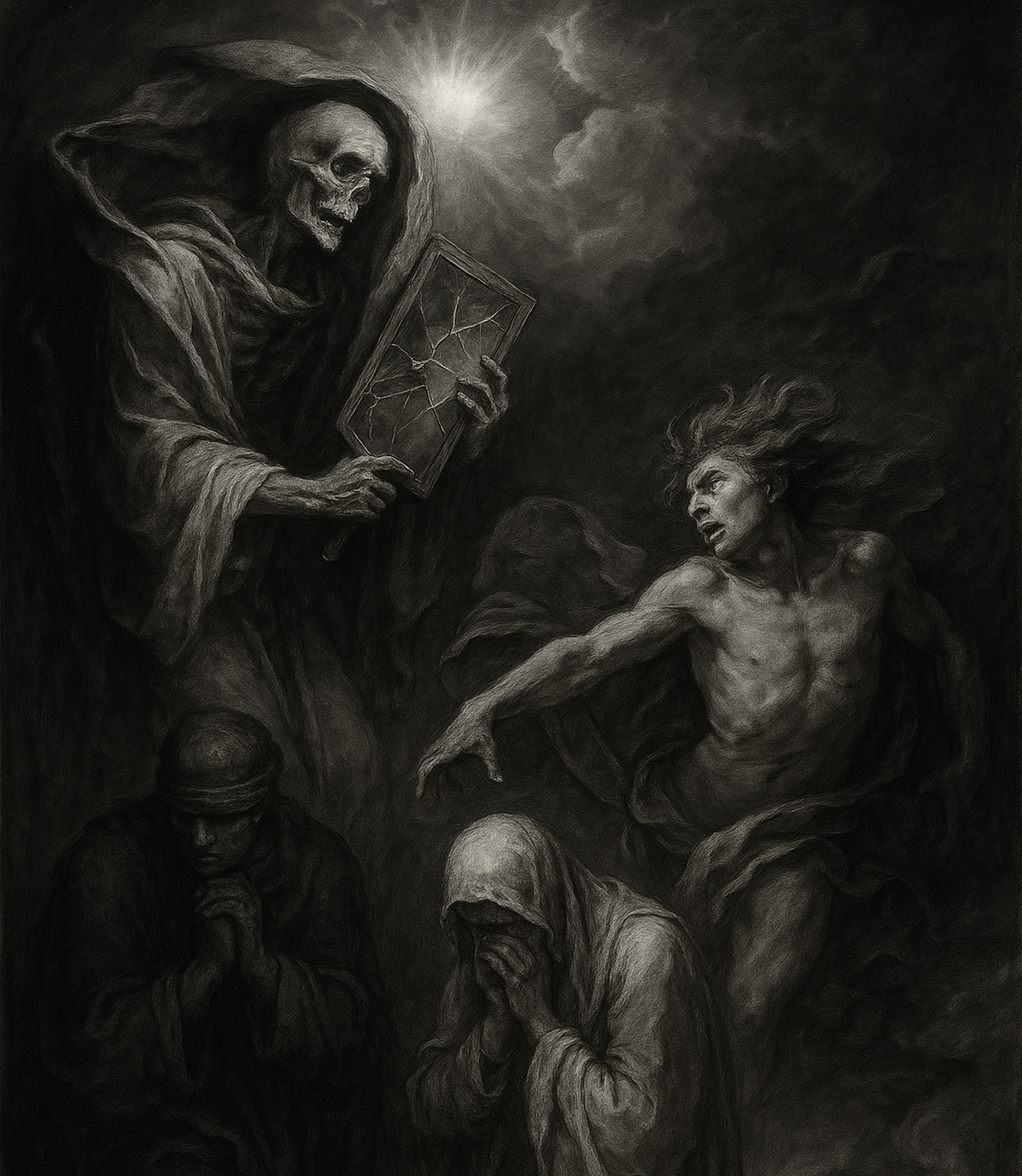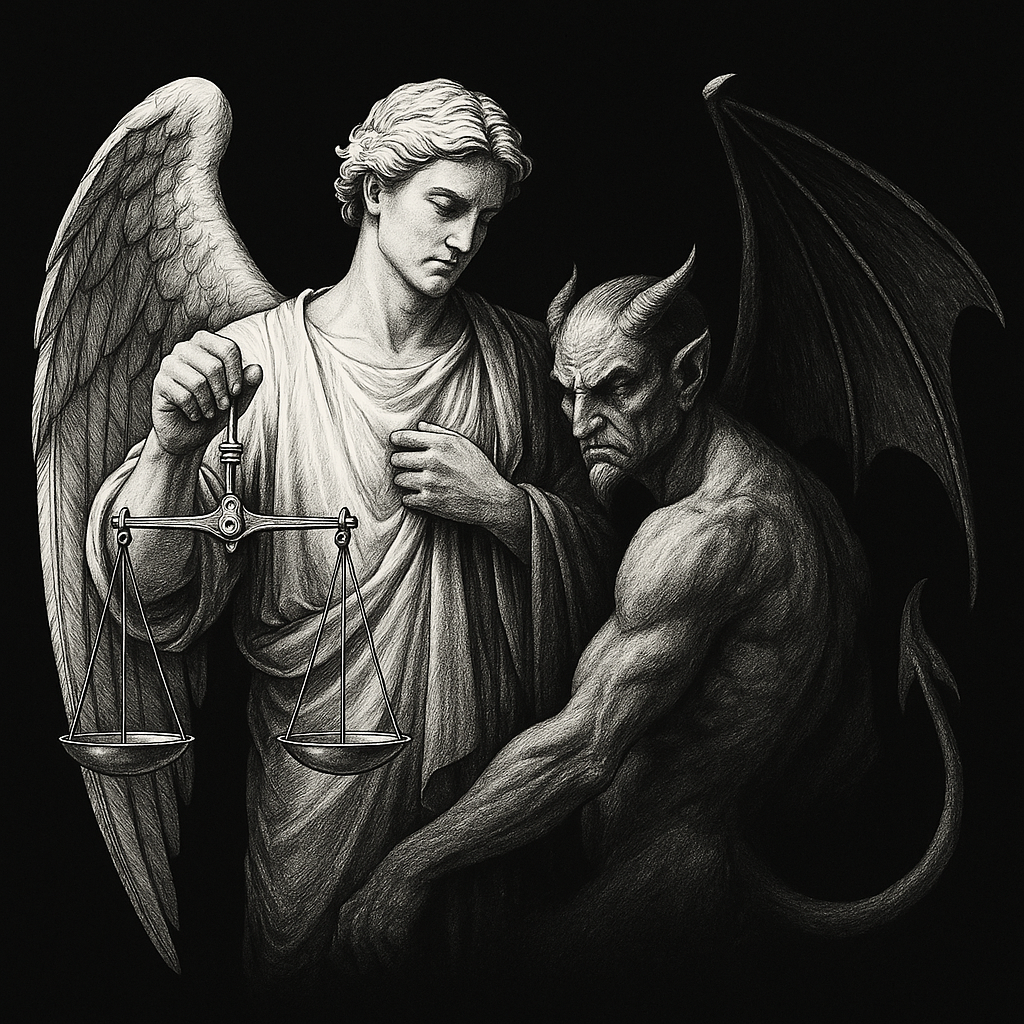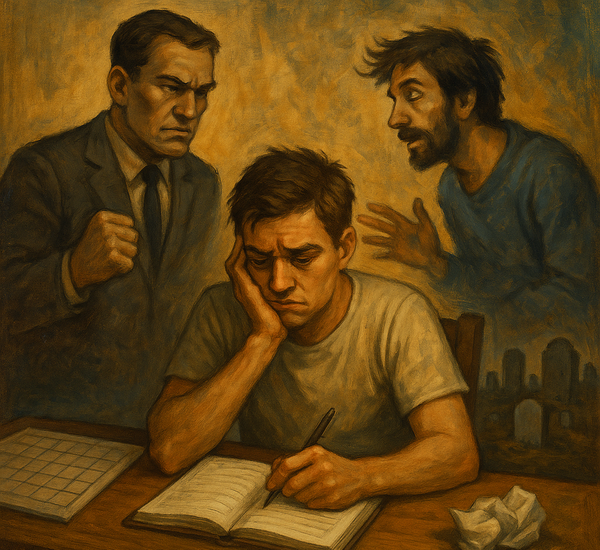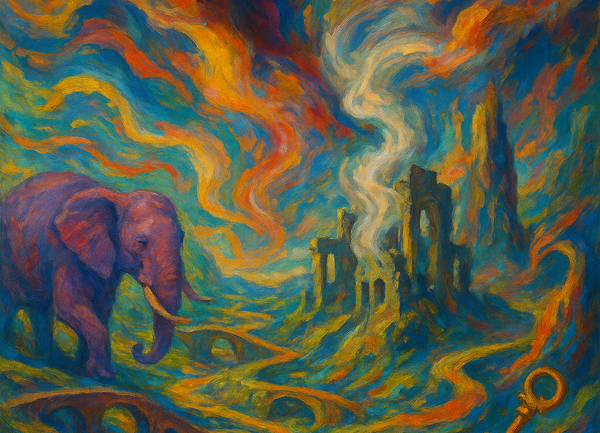The Four Forces of Meaning: A System for People Who Think MBTI Isn’t Enough

I’ve always been obsessed with frameworks that try to define people.
And I’ve always been arrogant enough to think I could make a better one.
But after writing many, I’ve realized:
- There is no perfect system.
- We are infinitely more complex than any framework could map.
- We’re all unique — different flavors, different fractures.
So, no — this system isn’t perfect either. It's also just for exploration purposes.
MBTI Told Me How I Think — But Not Why I Break
MBTI is a framework based on Jung’s theory of psychological types.
It maps how your brain prefers to take in information (sensing vs intuition),
how you make decisions (thinking vs feeling),
and whether you orient to the world through structure or spontaneity (judging vs perceiving).
It’s not about your values or your wounds —
it’s about cognition and behavioral preference.
Cool.
But it also opened up a deeper wound:
Who the fuck am I?
As an ENTP (the MBTI type I assigned myself),
I was described as curious, fast, and sharp.
Big ideas. Endless improvisation.
Charming in a manic kind of way. (Self-added)
Great!
But none of it explained why I still felt so lost after reading it excessively.
It told me how I moved through the world.
But it didn’t tell me why I was doing the moving.
Or what I was leaving behind in the process.
No purpose.
No meaning.
Just a little better understanding.
Two Forces, One Compass
A meaning-first system for mapping who you are — and how you impact others.
- One is your core → how you keep yourself together.
- One is your expression → how you interact and impact others.
These are not personalities.
These are not vibes.
These are existential forces — primary modes of being-with.
Each of us is grounded in one and expressed through another.
Because what is meaning, if not the tension between:
who I am <—--——> Who am I trying to become?
Confused?
Think of the split between what you think and what you say.
One holds you together. The other shapes your impact.
This system maps that tension — a compass of meaning, not personality.
And what are the ways I can name this?
So why a compass? While most people have one center piece of "who they are," we are very fluid in who we are trying to become. So your compass will not always point north. It might point in two different directions
—south-west, if I may. I need some sun.
TRUTH (1)
▲
│
│
LOYALTY (3) ◄─────┼─────► VITALITY (4)
│
│
▼
MORALITY (2)
P.S. There is no order in the compass. I just picked what felt right for me.
~ I also feel oddly satisfied that 1,2,3,4 makes a little cross;
1. Truth – The internal scalpel
“I stay sane by refusing to lie to myself.”
- Clarity. Self-honesty. Pattern recognition.
- Anchored in personal reality, not fantasy, not comfort.
- Seeks understanding, even if it hurts.
- Will take a relationship apart if it no longer reflects what’s real.
World perception: Life is tolerable only when it’s honest.
Shadow: Can become cold, obsessive, or disconnected from feeling.
2. Morality – The internal compass
“I stay upright by knowing what’s right.”
- Integrity. Meaning. Ethics. Framework.
- Anchored in personal codes — even if they clash with others.
- Seeks alignment, purpose, justice.
World perception: Life is bearable when it has meaning.
Shadow: Can become rigid, judgmental, or controlling.
3. Loyalty – The internal anchor
“I stay whole by standing with others.”
- Presence. Devotion. Unshakable relational trust.
- Anchored in belonging, consistency, and forgiveness.
- Seeks connection and continuity over time.
World perception: Life is survivable when we don’t abandon each other.
Shadow: Can become self-sacrificing, codependent, or blind to harm.
4. Vitality – The internal flame
“I stay alive by refusing to stay still.”
- Instinct. Motion. Energy. Emotional ignition.
- Anchored in experience, sensation, chaos, and humor.
- Seeks felt life — not theoretical, not delayed.
World perception: Life is worth living only when it moves.
Shadow: Can become destructive, overwhelming, or hollow without grounding.
How do they map with meaning?
# How do you stay intact?
# How do you interact?

Truth core
“I stay intact by being honest with myself. Reality keeps me sane.”
You see clarity as survival. You're allergic to illusions — especially your own.
But how you express that truth radically shifts your social impact.
Truth+Morality Expression = The Ethical Disruptor
You channel truth into values. Your truth has a should.
You hold people to it — lovingly, sometimes fiercely.
You want reality to lead to better behavior.
- You express truth like a teacher or reformer.
- Misread as judgmental.
- But really? You’re trying to protect what matters.
Truth+Loyalty Expression = The Steady Mirror
You tell people the truth, but you stay.
You’re not here to rip things apart — you stay in the discomfort.
You deliver truth slowly, kindly, but without compromise.
- Misread as passive or too soft.
- In reality, you’re just patient with people’s mess.
Truth+Vitality Expression = The Firestarter
You express truth with energy, movement, disruption.
Your honesty feels like a slap, a joke, a spark.
- Misread as chaotic or aggressive.
- But your fire has direction — you're not just being loud. You're cutting through noise.
Truth+Truth = ❌ The Isolated Analyst
“Only what’s real matters. Emotion is noise. People are liars.”
You’ve gone full objectivity — disconnected from connection, joy, or meaning.
You don’t believe in love. You don’t believe in belief.
You see patterns. You dissect everything, including yourself.
~ Does anyone else feel this? No? * pun intended
- Collapse into: nihilism, detachment, total emotional disconnection
- Extreme forms: paranoia, conspiracy obsession, depressive isolation
- Mental breakdown form: existential dissociation — nothing feels real, including you
Caused by:
- Emotional neglect — where no one mirrored your feelings, so you turned inward
- Betrayal trauma — when trusted people gaslit, lied, or manipulated you
- Over-responsibility in childhood — forced to “make sense” of adult problems early
🛡 What it protects you from:
- Emotional overwhelm
- Trusting people who will hurt you
- Feeling stupid, naive, or fooled

Morality Core
“I stay intact by doing what’s right. Integrity keeps me whole.”
You live by a code — even when it’s hard.
But you express that morality in different ways.
Morality+Truth Expression = The Justifier
You back your values with facts.
You use evidence, logic, and truth to defend your ethics.
Your beliefs aren't just emotional — they’re substantiated.
- Misread as cold or rigid.
- But for you, logic proves morality.
Morality+Loyalty Expression = The Devoted Guide
You embody morality by standing by people who share your values.
You don’t preach — you support, protect, and reinforce what’s “good.”
- Misread as enabling.
- But you're loyal to people because of what they believe, not just who they are.
Morality+Vitality Expression – The Righteous Flame
You express morality through energy, activism, fire.
You speak out, fight, and rally.
- Misread as exhausting or overbearing.
- But you move people because your cause burns inside you.
Morality+Morality = ❌ The Righteous Executioner
“I must be good. You must be good. Or you must be gone.”
This is not ethics. It’s dogma with a knife.
No room for nuance. No room for contradiction.
When morality becomes both your anchor and your weapon, you start believing you are justice.
~ Social justice warriors, where are you? Oh here..
- Collapse into: fanatical thinking, moral absolutism, black-and-white judgment
- Extreme forms: cult leaders, ideologically motivated violence, vigilante justice
- Mental breakdown form: delusional righteousness — no empathy, just purity tests
Caused by:
- Moral injury — growing up in a system where doing the right thing got you punished or ignored
- Shame trauma — where love was conditional on goodness, purity, or obedience
- Ideological environments — where nuance was treated as betrayal
🛡 What it protects you from:
- The chaos of ambiguity
- The unbearable grief of being wrong
- The fear that if I’m not good, I won’t be loved

Loyalty Core
“I stay intact by standing with others. I don’t abandon. That’s my code.”
You're held together by commitment, presence, and relational stability.
But your expression gives your loyalty its form.
Loyalty+Truth Expression = The Quiet Mirror
You love people enough to tell them the truth.
You don’t run — but you don’t sugarcoat, either.
- Misread as too soft.
- But your honesty is rooted in love, not superiority.
Loyalty+Morality Expression = The Protective Judge
You stay — and expect people to grow.
You use your loyalty to help people become better.
- Misread as controlling.
- But you believe in people enough to push them.
Loyalty+Vitality Expression = The Wild Protector
You fight for people. Loudly. Visibly.
Your love is action-packed — sometimes reckless, but always sincere.
- Misread as dramatic.
- But you’d burn the world down for the people you love.
Loyalty+Loyalty = ❌ The Codependent Martyr
“I’ll never leave. Even if it kills me. Even if you’re hurting me.”
You stay no matter what. Even when you’re being destroyed.
You confuse pain with loyalty.
You believe that abandoning others is worse than abandoning yourself.
~ Did I mention I have a friend like this?
- Collapse into: chronic self-sacrifice, toxic entanglement, emotional enmeshment
- Extreme forms: abusive relationship cycles, Stockholm Syndrome
- Mental breakdown form: identity loss through overattachment — you don’t know who you are without them
Caused by:
- Attachment trauma — unpredictable caregivers, fear of abandonment
- Caretaker role in childhood — had to keep the family/emotional system together
- Rewarded for suffering — loved only when sacrificing
🛡 What it protects you from:
- Being alone
- Feeling useless or unwanted
- The guilt of choosing yourself

Vitality Core
“I stay intact by staying in motion. Feeling alive is my only compass.”
You're animated by instinct, movement, and energy. You don’t sit still.
But your expression shapes what you do with that energy.
Vitality+Truth Expression = The Existential Burner
You don’t just move — you break illusions.
Your chaos serves clarity. You say the things no one dares to say.
- Misread as volatile.
- But you’re actually cutting through lies — fast.
Vitality+Morality Expression – The Passionate Preacher
You channel your fire into belief. You make people care.
You turn conviction into motion. You animate values.
- Misread as self-righteous.
- But you’re not moralizing — you’re trying to wake people up.
Vitality+Loyalty Expression – The Emotional Storm
You move with and for the people you love.
You’re the ride-or-die who shows up with too much intensity and zero apologies.
- Misread as overbearing.
- But your fire comes from deep care.
Vitality+Vitality = ❌ The wreck-runner
“If I’m not moving, I disappear. If I stop feeling, I die.”
Everything’s on fire. Always.
You feel deeply, move fast, speak loudly — but it’s all impulse. No grounding.
You chase intensity because silence feels like death.
~ I'm sorry I wasn't reading, I was already moving on to the next one. Is there no next one? NEXT THING THEN! Here comes the train!
- Collapse into: addiction, mania, self-destruction for stimulation
- Extreme forms: reckless risk-taking, emotional whiplash, burnout cycles
- Mental breakdown form: unregulated nervous system — always in fight, flight, or collapse
Caused by:
- Chaotic home environment — where safety = staying one step ahead
- Emotionally reactive parenting — love came in bursts, followed by silence
- Neglect — you had to be dramatic or loud just to be seen
🛡 What it protects you from:
- Feeling invisible
- Stillness (which feels like death)
- Vulnerability without armor
Imagine having this issue and being diagnosed as "ADHD" and people just pushing pills to solve your problem. Oh, wait, we do things like that? Shit..
What does this give us if we look deeply?
At first glance.... Not a lot. Because all combinations allow for all possible decisions:
Someone grounded in loyalty stays because they care too much about the person.
Someone grounded in morality stays because they can't stand the idea of being unfair, disloyal, or the one who gave up first.
Or the opposite:
Someone grounded in loyalty leaves because they know you would want it.
Someone grounded in morality leaves because they can't stand the idea of being unfair or disloyal to the relationship.
So what does it give you?
A compass. A tool to navigate your life, not define it. It can help you give words to your actions and experiences. It can help you understand other people on a deeper level if you want to. Or it can help you give direction on where to find your meaning.
Here are some things that might help you:
1. Why people misread you
Example for myself:
I'm grounded in truth, but want to express vitality.
I want you to grow, but I don't necessarily say the things you want to hear, or are emotionally keeping you stable. I say the things that I believe will give you the most growth in the least amount of words.
It also shows my typical traits:
- I don't compliment a lot, but when I do, I really mean it
- I only say things that hurt you to grow if I like you; otherwise, I don't bother
(So I'm harsher on my friends than I am on a stranger.)
2. Why some friendships drain you
If you're grounded in loyalty but express morality, you may spend years trying to fix people who don’t actually want to grow.
3. What kind of relationships stabilize you
Someone grounded in vitality may need a friend who holds loyalty, to keep them from burning out.
You might think the reverse would be the same — that if you're grounded in morality and express loyalty, you'd also stay too long. But it's not.
4. Why your pain shows up the way it does
If you're grounded in morality but express truth, failure feels like betrayal of self, not just error. Your identity is wrapped around "being right and real."
5. How to evolve with intention
You can't change your core, but you can refine your expression.
Learn when your vitality needs containment.
Learn when your loyalty needs honesty.
Learn when your truth needs gentleness.
How does it compare to MBTI?
Let’s take one hypothetical person.
Say someone is an INTJ in MBTI:
- Internal, structured, vision-driven, analytical
- Strategic, detached, systems-thinker
In the Four-Force System, this person might be:
- Truth-core / Morality-expression
→ The Analyst-Preacher combo. They live by reality and speak through meaning.
Or:
- Morality-core / Truth-expression
→ The Ethical Judge. They live by conviction, but cut with facts.
Both would make sense depending on their motivation:
- Do they seek truth as a way to survive? (Truth-core)
- Or is truth their weapon for enforcing inner ethics? (Morality-core)
MBTI wouldn’t tell you this.
But the force model gets at the deeper “why.”
What about things that derive me from my path?
The compass shows you how to move.
But what about what you can’t see?
Behind every force that holds you together is a tension — a blindspot, a distortion, a psychological fog.
These aren’t just opposites. They’re the unknowns that warp your path.
Not who you are — but where you collapse when you stop paying attention.
Think of them like gravitational pull: not your direction, but the force that pulls you off course when you’re tired, triggered, or trying too hard to stay intact.
| Core Force | Shadow/Duality | Deep Question |
|---|---|---|
| Vitality | Mortality | What makes life worth feeling? |
| Morality | Relativism | Can you stay good without being rigid? |
| Truth | Illusion | What do you lose when you stop lying to yourself? |
| Loyalty | Autonomy | When does staying become self-abandonment? |
Somewhere between cognitive bias and self-prescribed painkillers these shadow and duality lies. A deeper topic to explore
Why these 4 and not other things?
You might also wonder — why not include things like Love, Power, Freedom, or Creativity?
Because those are expressions, needs, or outcomes, not core orientations.
This compass isn’t about surface traits or emotional preferences.
It’s about the existential force that holds you together, and the one that pulls you outward.
Love can be a form of loyalty.
Power might grow from morality or vitality.
Freedom often comes from truth.
But underneath them all, these four forces are what I kept seeing.
Again and again. In myself. In others.
As the why beneath the what.
Will I change my mind? Probably. Maybe even tomorrow.
Which is why you should probably sign up for the mailing list—so I can send you the next breakdown before I rewrite this one.
Don’t worry — I’m not selling your email.
As an IT guy, I’ve had access to deeply unethical lists of emails…
And I still didn’t add those.
That’s how much I respect you.
(Also: feel free to criticize. Just… be soft. I have a tender soul.)
Cheers,
— Dr. Chaos



